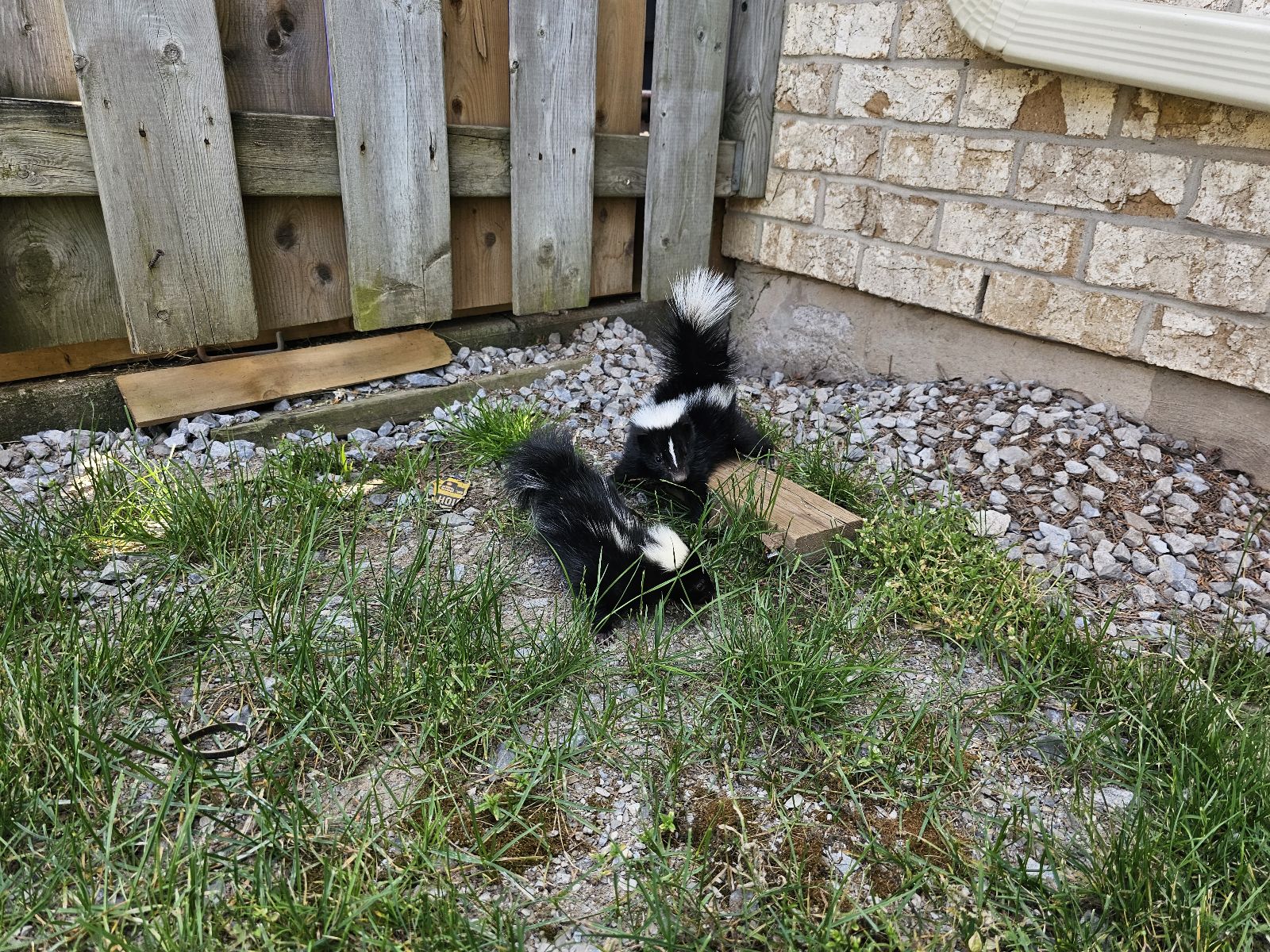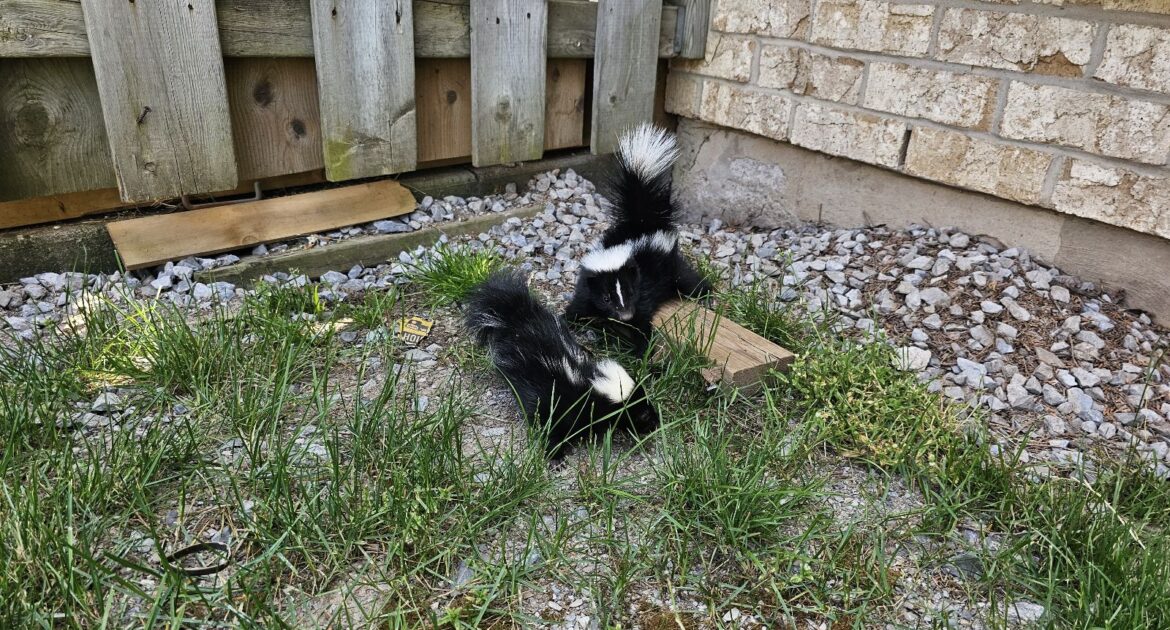While many of us are sound asleep, the world around us continues to buzz with activity. One such fascinating creature that comes alive under the cover of darkness is the skunk. These black and white mammals are known for their distinctive appearance and their ability to produce a strong odour when threatened. But what exactly do they get up to during the night? This blog post seeks to explore the intriguing nocturnal habits of skunks, providing homeowners and property owners with a better understanding of these animals and their nighttime activities.
The Difference Between Nocturnal and Diurnal Animals
Before we jump into the specifics of skunk behaviour, it’s essential to grasp the difference between nocturnal and diurnal animals. Nocturnal animals are those that are active during the night, while diurnal animals are active during the day. This distinction affects their behaviours, adaptations, and interactions with the environment.
Nocturnal animals typically have heightened senses to help them thrive in low-light conditions. Many have excellent night vision, acute hearing, and a keen sense of smell. These adaptations allow them to find food, avoid predators, and interact with their surroundings effectively during the dark hours.
On the other hand, diurnal animals, including humans, rely more on vision in brightly lit environments. Their activities are aligned with daylight, making them more visible and vulnerable to nocturnal predators. This natural rhythm influences how different species interact and coexist within various ecosystems.
Why Are Skunks Nocturnal?
Skunks are primarily nocturnal for several reasons. One major factor is predation. By being active at night, skunks reduce the risk of encountering predators such as coyotes, foxes, and birds of prey. The cover of darkness provides a level of protection, allowing them to move around more safely and go about their nightly routines with reduced threat from these natural enemies.
Another reason for their nocturnal lifestyle is to avoid competition with other animals for food. Many other small mammals and birds are diurnal, which means they are busy foraging for food during the day. By being active at night, skunks can access food sources without competing directly with these animals. This helps ensure they get enough to eat and can support themselves and their families.
Food availability also plays a significant role in their nocturnal habits. Many of the insects, small mammals, and plants that skunks feed on are more accessible or abundant during the night. This nocturnal activity maximizes their chances of finding food and helps them maintain a balanced diet.
The Nightly Routine of Skunks
When night falls, skunks emerge from their burrows or dens to begin their nightly activities. These animals are known for being solitary creatures, usually only coming together during the breeding season or when a mother is raising her young. Their nightly routine involves several key activities:
Foraging for Food
Foraging is arguably the most critical part of a skunk’s nocturnal routine. Skunks have a varied diet that includes insects, small mammals, fruits, and vegetation. They use their keen sense of smell to locate food sources, often digging in the ground to find insects or small animals hidden below the surface. Their strong front claws are perfect for this task, allowing them to unearth potential meals with ease.
In urban and suburban areas, skunks may also forage for human food scraps. They are known to rummage through garbage cans and compost bins, looking for leftovers. This behaviour can sometimes lead to conflicts with humans, as skunks may make a mess in their search for food.
Marking Territory
Skunks are territorial animals, and part of their nightly routine involves marking their territory to ward off other skunks and potential predators. They use a combination of scent markings and visual cues to establish and maintain their territory. The scent is produced by glands located near their tails, which also play a role in their defensive spray.
By marking their territory, skunks communicate with other animals in the area, signalling their presence and deterring potential intruders. This territorial behaviour reduces the likelihood of conflicts with other skunks and helps maintain a stable population within a given area.
Mating and Raising Young
During the breeding season, skunks become more social and may interact with multiple partners. The mating season typically occurs in late winter or early spring, with females giving birth to a litter of kits about two months later. These young skunks stay with their mother for several months, learning essential survival skills and gradually becoming more independent.
The mother skunk plays a crucial role in raising her young, teaching them how to find food, avoid predators, and mark their territory. This period of care and instruction is vital for the survival of the kits, ensuring they are well-prepared to fend for themselves once they leave their mother’s side.
Skunks and Human Interaction
Skunks and humans often live in close proximity, especially in suburban and rural areas. While skunks can be beneficial for controlling insect populations, their presence can also lead to conflicts with humans. Understanding their nocturnal habits is essential for minimizing these conflicts and maintaining a peaceful coexistence.
One common issue homeowners face is skunks taking up residence under decks, sheds, or porches. These areas provide shelter and protection, making them attractive den sites for skunks. To prevent this, it’s essential to seal off any potential entry points and ensure that structures are well-maintained.
Another issue is skunks foraging in garbage cans or compost bins. To deter this behaviour, homeowners should secure their garbage cans with tight-fitting lids and avoid leaving food scraps in accessible areas. Compost bins should be well-sealed and maintained to prevent skunks from getting in.
Mitigating Human-Skunks Conflicts
Effective strategies for reducing human-skunk conflicts focus on habitat modification and behavioural practices. Homeowners should ensure that outdoor living spaces are kept tidy and devoid of food sources that may attract skunks. This includes keeping pet food indoors, cleaning up fallen fruits from trees, and storing compost in secure containers.
Education is equally vital. By understanding skunk behaviour, individuals can learn to recognize signs of their presence and take precautionary measures. For example, if skunks are spotted foraging, it may be prudent to limit outdoor activities during their peak hours of activity and avoid feeding pets outside after dusk.
In situations where skunks become a nuisance or pose a safety concern, it is advisable to contact Skedaddle for local wildlife control services. Our professionals can provide safe and humane solutions for problematic skunks without harm to the animals or disruption to local ecosystems. By adopting these practices, communities can foster a more harmonious coexistence with skunks while appreciating the vital role they play in the environment.
The Importance of Professional Wildlife Control
While it’s possible to take some preventative measures to minimize skunk encounters, it’s essential to leave wildlife control to the professionals. Attempting to handle skunks on your own can be dangerous and may lead to unintended consequences. Professional wildlife control experts have the knowledge, experience, and tools to manage skunk-related issues safely and humanely.
At Skedaddle, we specialize in humane wildlife control, ensuring that skunks and other animals are treated with respect and care. Our team of experts is trained to handle various wildlife situations, from removing animals from your property to implementing long-term prevention strategies. By choosing professional wildlife control services, you can ensure the safety of both the animals and your property.
Choose Skedaddle for Skunk Removal in Ottawa
Understanding the nocturnal habits of skunks provides valuable insights into their behaviour and helps homeowners and property owners coexist peacefully with these fascinating creatures. By recognizing the reasons behind their nocturnal lifestyle, we can take appropriate measures to minimize conflicts and maintain a harmonious relationship with the wildlife around us.
If you encounter skunks on your property or need assistance with wildlife control, don’t hesitate to contact Skedaddle. Our team of experts is ready to help you address any skunk-related issues safely and humanely. Trust Skedaddle for all your wildlife control needs and ensure a peaceful coexistence with the nocturnal creatures in your neighbourhood.




